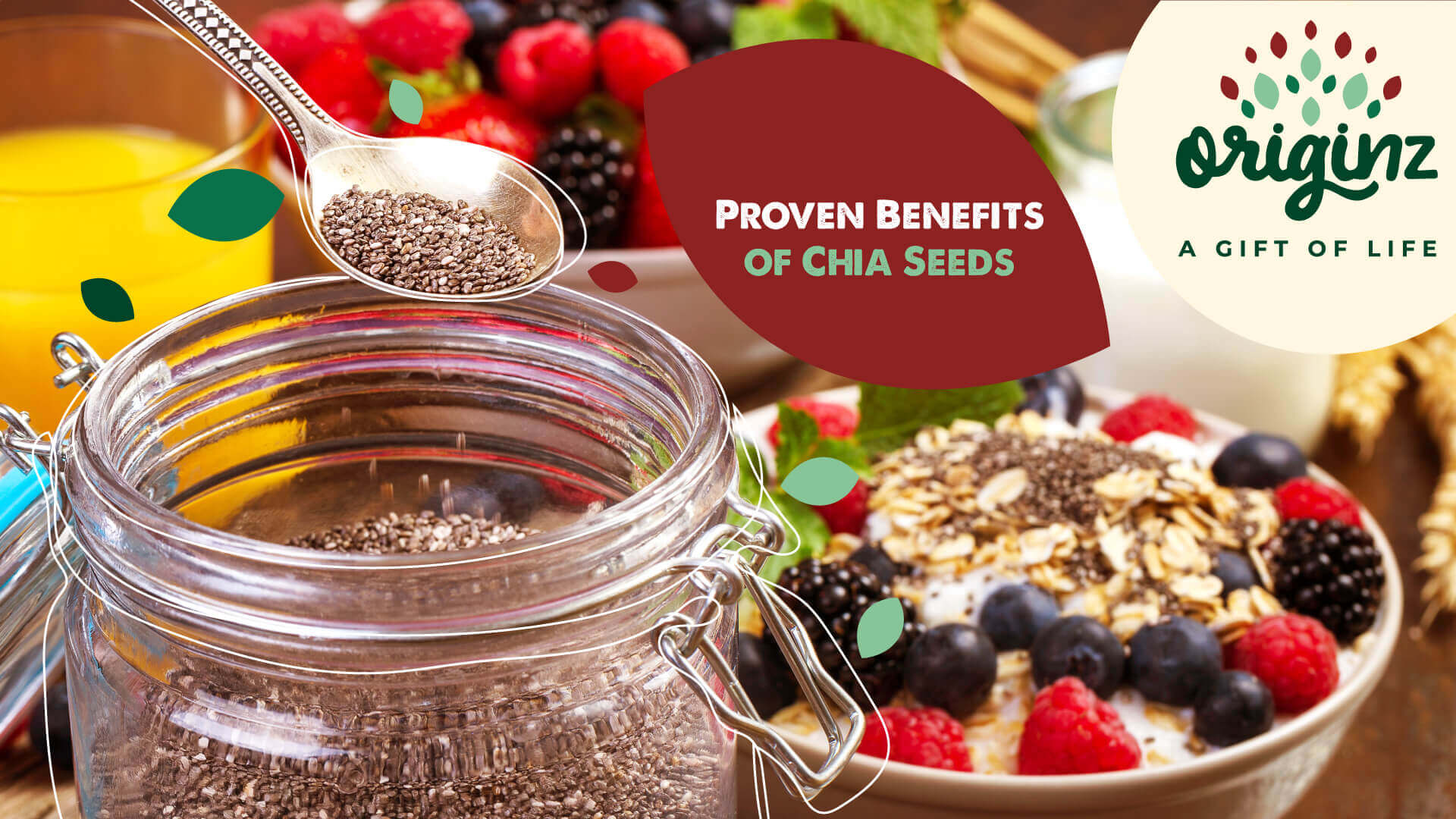
Proven Benefits of Chia Seeds
Chia seeds – a food item that punches well above its weight in terms of health benefits. Their small size contains a large variety of nutrients, and their unique physical properties mean that there are far more ways to incorporate them in your diet than you might expect. They are also very easy to produce and farm organically, and in an era where people are becoming more conscious of what they put in their bodies, you can reliably expect that chia seeds won’t have the added pesticides and chemicals that conventional processed food does. Here we will explore just ten of the many health benefits of chia seeds to inspire you to include them in your diet.
Rich in Nutrients
Chia seeds are a nutritional powerhouse. Just a small serving contains a wide range of essential nutrients. They are an excellent source of dietary fibre, providing close to 10 grams of fibre in just 2 tablespoons. Fibre is crucial for digestive health and can help prevent constipation.
Weight Management
Chia seeds are often included in weight loss and management plans due to their high fibre content. When consumed with liquid, chia seeds form a gel-like substance in the stomach, promoting a feeling of fullness. This can help reduce overall calorie intake and aid in weight management. For more information on chia seeds for weight loss, see the linked blog!
Digestive Health
Chia seeds' fibre content not only helps with regular bowel movements but also supports the growth of good gut bacteria, thereby promoting a healthy digestive system. A healthy gut is linked to better overall health and a stronger immune system.
Heart Health
Chia seeds are a rich source of alpha-linolenic acid (ALA), a type of omega-3 fatty acid. ALA has been associated with reduced inflammation, lower blood pressure, and improved cholesterol levels, all of which contribute to a healthier heart and reduced risk of chronic disease later in life.
Blood Sugar Regulation
Chia seeds can help stabilize blood sugar levels, which is particularly beneficial for individuals with diabetes or those with a family history of diabetes. The fibre in chia seeds makes sugars absorb slower into the body, preventing rapid spikes and crashes in blood sugar.
Bone Health
Chia seeds contain important minerals like calcium, magnesium, and phosphorus, which are essential for strong and healthy bones. A rich calcium intake is vital for staving off osteoporosis and keeping your bone density at ideal levels.
Antioxidant Properties
Chia seeds contain an array of antioxidants, including quercetin, chlorogenic acid, and caffeic acid. These antioxidants help protect cells from oxidative stress and damage caused by free radicals, reducing the risk of chronic diseases like cancer and heart disease.
Hydration
Chia seeds have a unique ability to absorb and retain water. When consumed with liquid, they form a gel-like substance. This gel can help with hydration, making chia seeds a valuable addition to your diet, especially during workouts or in hot weather.
Skin Health
Omega-3 fatty acids found in chia seeds can help reduce skin inflammation and maintain moisture, resulting in healthy, glowing skin. Including chia seeds in your diet may help you keep a more youthful appearance and improve your skin health.
Plant-Based Protein
Chia seeds are a great source of plant-based protein, making them an excellent option for vegetarians, vegans, and environmentally conscious people looking to eat less meat. They provide all nine essential amino acids that help the body make and repair essential proteins.
FAQs
How can I incorporate chia seeds into my diet?
Chia seeds are a highly versatile food which can be added into many foods and beverages. Common ways to use them include mixing them into smoothies, yoghurt, or oatmeal. You can also use them as a topping for salads and cereals, or mix them with water to make chia gel.
What actually is chia gel anyway?
Chia gel is any mixture of chia seeds and liquid that is left to sit so that the seeds can absorb water. It is usually made by mixing one part chia seeds with four parts liquid – this can be anything from water or milk to fruit juice or yoghurt. You can adjust the ratios to change the thickness to your taste. Once you have made your chia gel, you can use it as a base for chia pudding, as an ingredient in a smoothie, or even as a replacement for egg in baking!
Do chia seeds interact with medicines?
Chia seeds are generally safe to eat with most medications. However, if you are taking a medicine that affects blood clotting or blood sugar levels, it is generally good to consult with a doctor or dietitian before adding chia seeds to your diet.
Chia seeds are becoming ever more popular in the organic and health food scene, and it is easy to see why. Despite their appearance, they are full of vital nutrients and minerals, and are extremely versatile and easy to add to your favourite breakfast recipes. You can even combine chia seeds with other seeds and grains, such as flax seeds, to maximise your health benefits.
Further Read,
Latest Blogs

Maintaining Healthy Habits After Ramadan
Have Ramadan healthy meals after Ramadan and maintain healthy food habits and implement them in your daily lives. Read more about healthy food habits.

Authentic Middle Eastern Iftar Meals to Prepare This Ramadan
Prepare some authentic middle eastern iftar meals this Ramadan. Look for fresh Ramadan food ideas and make your day memorable with these dishes. Check them out.

Ramadan Dishes to Cure Fasting Fatigue
Don’t worry about fasting fatigue anymore as we have listed some best Ramadan dishes and easy iftar meals to support your fasting journey. Check them out.

Eid-al-Fitr Feast: Delicious Recipes to Celebrate the End of Ramadan
Celebrate the end of Ramadan with delicious recipes on the eve of Eid ul Fitr. Read more about the traditional Ramadan recipes and make them easily.